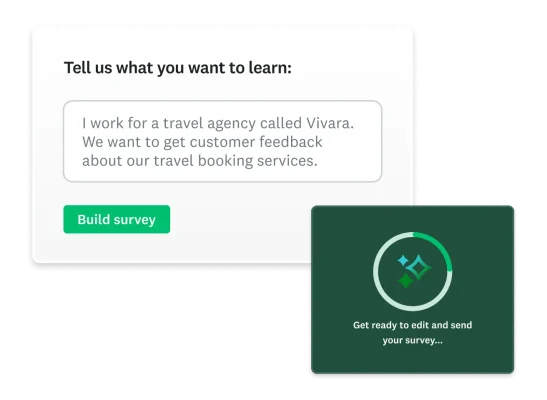28 AI marketing statistics you need to know in 2025
Discover how marketers use AI and dive into SurveyMonkey research on AI usage in marketing.

The use of artificial intelligence (AI) in marketing is skyrocketing. AI is helping to enhance marketing processes and improve data analysis.
So how can savvy marketers stay ahead of the AI curve in 2025? And how can you leverage AI to launch successful campaigns?
Read on to see 28 AI in marketing statistics and learn how to leverage AI in your marketing strategy.
28 AI in marketing statistics
The marketing landscape has done a 180-degree turn since the onset of the COVID-19 pandemic. Is the rise of AI in marketing a shiny new toy or is it here to stay? To uncover the answers, we conducted an AI marketing trends study and an AI in the customer experience study. Read on to see our findings and other industry reports.
How marketers feel about AI

- 69% of marketing professionals feel excited about AI technology and its impact on their jobs (SurveyMonkey).
- 17% are excited and worried about AI’s impact on their job (SurveyMonkey).
- 60% are very optimistic about the direction their industry is heading in (SurveyMonkey).
- 1% of marketers are very pessimistic about the direction their industry is heading in (SurveyMonkey).
Marketing AI adoption
- 56% of marketers say that their company is taking an active role in implementing and using AI (SurveyMonkey).
- 44% of companies are waiting for more established solutions before implementing AI (SurveyMonkey).
Implementation
- 32% of marketing organisations have fully implemented AI (Salesforce).
- 43% of marketing organisations report experimenting with AI (Salesforce).
Marketing use cases for AI

- 51% use AI tools to optimise content, from email campaigns to search engine optimisation (SurveyMonkey).
- 50% create content using artificial intelligence (SurveyMonkey).
- 45% use AI to brainstorm content ideas (SurveyMonkey).
- 43% of marketing professionals automate repetitive tasks and processes using AI software (SurveyMonkey).
- 43% think that AI is important to their social media strategy (SurveyMonkey).
- 41% analyse data for insights with AI tools (SurveyMonkey).
- 73% say that AI plays a role in creating personalised customer experiences (SurveyMonkey).
Reasons why marketers aren’t adopting AI
- 39% of marketers aren’t sure how to safely use gen AI (generative AI) (Salesforce).
- 43% say that they don’t know how to get the most value out of gen AI (Salesforce).
- 54% say that gen AI training is important for using gen AI in their role (Salesforce).
- 70% report that their employer does not provide gen AI training (Salesforce).
Top AI challenges faced by marketers
- 50% of marketers foresee performance expectations increasing (SurveyMonkey).
- 49% of marketers and their teams expect to change tools and software (SurveyMonkey).
- 48% believe that they may see changes in strategy or direction (SurveyMonkey).
- 31% of marketers have accuracy and quality concerns about AI (Salesforce).
Future of using AI for marketing
- 70% of marketers expect AI to play a bigger role in their work.
- 48% say that increasing AI adoption is a top goal.
Consumers’ sentiments around AI in marketing
- Among Gen Z-ers, 66% were interested in AI that would assist them while navigating a product or website, 63% liked the idea of personalised deals and 56% wanted tailored product recommendations (SurveyMonkey).
- 18% say they are “very confident” that they can detect chatbot interactions (SurveyMonkey).
- 90% of people prefer a human customer service representative to a chatbot (SurveyMonkey).
- 41% of people under 34 have negative feelings about the idea of companies using AI in CX vs. 72% of people over 65 (SurveyMonkey).
Related reading: International perspectives on AI
What is AI in marketing?
AI in marketing is the use of artificial intelligence tools to streamline the duties of a marketer. Marketing teams can leverage AI to enhance brainstorming, content writing and personalisation efforts. Equally, AI tools can offer machine learning, which can help improve data analysis and empower data-driven decision-making.
10 must-know marketing AI use cases for 2025
1. Optimising content
Optimising content is the leading use case for artificial intelligence tools, according to SurveyMonkey research. This broad topic encompasses everything from adding SEO keywords to copy to reworking content for different audiences.
Over half (51%) of marketing teams use AI to optimise content.
2. Creating content
The second most popular use of AI in marketing is content creation. When feeding an AI tool a writing prompt, marketing teams can create content quickly.
Some marketing teams use AI to produce marketing materials such as brochures, website designs, campaign plans and written content. The extent to which marketers edit generated content varies according to their trust and faith in AI content.
3. Personalisation
Customer demographics, interactions and behaviours, such as reading a blog or clicking a link, can help marketers accurately predict and respond to customers’ needs, preferences and future behaviours.
For example, AI personalisation can suggest related blogs on your website based on users’ reading histories.
4. Brainstorming content
One of the most useful deployments of artificial intelligence tools in marketing is for brainstorming content. By creating a short brief or proposal and including a handful of ideas, marketing teams can ask generative AI tools to aid brainstorming sessions by providing new ideas.
Artificial intelligence tools draw from public data, so they can generate fairly basic ideas. However, their rapid generation can be valuable for teams seeking quick inspiration.
5. Automating tasks
Automation is the fourth most popular use case of AI in marketing. Artificial intelligence tools can train on datasets and use machine learning to replicate these processes.
For monotonous tasks, AI’s automation of repetitive actions is a powerful time-saving tool. It allows marketing teams to focus on higher-priority activities and be more productive.
6. Social media monitoring
Forty-three percent of marketers think that AI is important for their social media strategy, and 48% think it’s somewhat important. Marketers use AI for social media monitoring to efficiently track and analyse many online conversations, providing real-time insights into customer sentiment and trends.
AI tools can identify patterns, detect potential issues early and highlight brand mentions, enabling marketers to respond proactively. This helps to improve brand reputation, customer engagement and strategic decision-making.
7. Analysing data
Data analysis is a vital part of marketing. Artificial intelligence tools can expedite the collection of data and the identification of patterns in datasets.
Marketing teams can deploy AI to help them analyse data on a larger scale, providing them with the insight they need to develop and launch campaigns effectively. For example, businesses can use AI-powered market research tools to streamline market research datasets, providing more rapid insight.
8. Conducting research
Forty percent of marketers use artificial intelligence to conduct research. AI-powered platforms, such as SurveyMonkey, help marketers gain product, market, brand and customer insights..

AI enhances response rates and data quality by offering question suggestions and ensuring an optimal survey length and format.
AI also helps marketers analyse insights just like data scientists do. Response Quality uses machine learning to identify poor-quality responses and clean data so you can focus on high-quality survey data. Sentiment Analysis helps you further analyse text responses to pinpoint feedback sentiment.
9. Customer journey mapping
Marketers use AI for customer journey mapping.
AI analyses behavioural data to uncover patterns and predict customer needs, leading to more targeted and timely interactions. This enhances customer satisfaction and loyalty by ensuring seamless and relevant experiences throughout their journey.
10. Chatbots and virtual assistants
AI chatbots and virtual assistants can provide instant, 24/7 customer support.
These chatbots can also gather valuable data about customer preferences, which marketers can analyse to refine strategies and personalise future interactions.
Advantages of AI in marketing
Here are some of the most important advantages of AI in marketing:
- Speed: Although artificial intelligence tools do not show impressive creativity, they have an enormous speed advantage over humans. For example, they could generate 100 ideas for a marketing campaign in a fraction of the time it would take for a marketing team to do the same. Leveraging AI’s speed is one of the most impressive advantages of AI in marketing.
- Breadth of knowledge: The wide knowledge base of AI platforms makes them a great resource for research and brainstorming.
- Automation: Another advantage of using AI in marketing is automation. By delegating repetitive tasks to AI, marketing teams can spend more time on tasks that generate profits.
These advantages provide cost savings to marketing teams, helping them improve the bottom line and produce campaigns faster.
Disadvantages of AI in marketing
Although AI in marketing has several advantages, there are also some disadvantages to be aware of.
Businesses should understand and take steps to adapt to the following disadvantages of AI in marketing:
- Data bias: Artificial intelligence platforms reproduce the inherent bias in the data they were trained on. If you are not careful when selecting and cleaning training data, the content that you produce with AI may be full of bias.
- Lack of creativity: AI tools are trained on publicly available data. Due to this, AI generates ideas that stem from pre-established campaigns and ideas. If you are looking for an innovative campaign idea or something to set your business apart, AI tools may not be the correct solution for you.
- Privacy concerns: Artificial intelligence regulation is still in its early days, meaning that many of the widely available tools currently on the market are in a compliance grey area. Regulations could change and teams must have processes to adapt to evolving regulatory standards.
5 steps to use AI in your marketing strategy
1. Define your objective and goals
The first step towards successful AI integration is to understand why you want to use these tools in the first place. A core goal or actionable plan for AI will provide a roadmap to successful onboarding.
Before you select your tools or start testing AI platforms, list goals or tasks on which you’d like to use AI, such as automating tasks or improving keyword targeting. By starting with the result that you would like to achieve, you can devise a clear strategy that will take you from A to B.
2. Assess your current capabilities
Before defining your AI goals, evaluate your current resources and identify areas where AI can add the most value. For example, if your marketing team excels at content marketing, you may not need a content AI developer. However, if you’re struggling to scale personalisation efforts, AI could be a perfect solution to improve efficiency and reach.
By assessing your team’s strengths and weaknesses, you can pinpoint where AI integration will have the greatest impact. Gathering employee feedback is a great way to understand where AI could be most beneficial in your workforce.
3. Choose the right AI tools
Once your marketing team has established which use cases you want to focus on, it’s time to look for AI tools.
To find the one that’s best for your team, consider:
- The scope of the tool: Does the AI platform focus on the exact use case you’re looking for or is it more general?
- Your total budget: Does your marketing team have the budget to cover the tool for an extended period?
- The ease of integration: Will the AI tool that you’ve selected integrate easily into your current tech stack?
- The required knowledge: Some AI tools, especially those related to data analysis, may have a steep learning curve. Using some platforms may require you to offer training to your staff members.
Based on your response to these questions, you can rule out certain tools. A platform may be too expensive, too complex or simply incompatible with your current data architecture.
4. Test and analyse AI data
One of the disadvantages of artificial intelligence in marketing is that AI data is prone to bias and hallucinations. Don’t allow these factors to hinder progress. Regularly collect, test and analyse AI data to pinpoint and remove these biases.
Businesses should review any AI-generated content. Although this step will slow down your team, it will ensure that copy and designs satisfy your brand standards.
Related reading: Turn feedback into actionable insights with survey analysis
5. Optimise your AI marketing strategy
Your AI marketing strategy will naturally evolve. As with all new projects, it’s important to set benchmarks, measure progress and look for areas for optimisation.
When it comes to AI in marketing, your staff will be the primary people who will have contact with the tools.
Pro tip: Ask for feedback by sending out an employee engagement survey. You can do this periodically to track how the uses of AI in your business evolve.
Frequently asked questions: AI in marketing
- What are marketers’ attitudes towards AI in marketing?
- What percentage of marketers use AI?
- What is the role of AI in the future of marketing?
Power your marketing strategy with SurveyMonkey
Using AI in your marketing could help improve processes and generate more ROI from your campaigns.
SurveyMonkey’s AI-powered platform helps marketers do just that. Marketers can build highly responsive surveys to collect customer insights that inform successful marketing efforts. Discover how you can use SurveyMonkey to enhance your marketing strategy or sign up for an account.
Ready to get started?
Discover more resources

Solutions for your role
SurveyMonkey can help you do your job better. Discover how to make a bigger impact with winning strategies, products, experiences and more.

How to Develop Market Positioning That Sets You Apart
Market positioning helps businesses to differentiate themselves and attract the right audience. Discover its types and steps to take to build a strong presence.

Hornblower enhances global customer experiences
Discover how Hornblower uses SurveyMonkey and powerful AI to make the most of NPS data, collect customer insights and improve customer experiences.

Shaping the future: how British values in the workplace drive inclusion and engagement
Discover how ‘British values in the workplace’ surveys can reveal what matters most to employees, fostering inclusion and engagement.